Many people with a traveling spirit are looking for RVs these days, and there are many RVs on the market of various sizes, types, and prices. We’ve seen some fabulous renovations of older RVs, which inspired us to write this post about buying a fixer upper RV.
So, if you’re in the market for an RV fixer upper, we’ve got 15 things for you to keep an eye out for as you shop. Let’s jump in!
- 1) What Is a Fixer Upper RV?
- 2) Where Do People Find Fixer Upper RVs?
-
3)
15 Things to Look For When Shopping For an RV Fixer Upper
- 3.1) Title
- 3.2) Price – Fair and Reasonable (For a fixer upper RV)?
- 3.3) Evidence of Water Damage
- 3.4) Condition of Roof
- 3.5) Electrical Issues
- 3.6) Rust (the hidden nightmare of a fixer upper RV)
- 3.7) Condition of Undercarriage (including axles)
- 3.8) Tires
- 3.9) Working Generator?
- 3.10) Air Conditioner (Cab and House)
- 3.11) Condition of Water Heater
- 3.12) Heating System
- 3.13) Plumbing
- 3.14) Engine or Towing System (depending on the type of RV)
- 3.15) Fixup Costs
- 4) Is Fixing Up an Old RV Worth It?
What Is a Fixer Upper RV?
What do we mean by “fixer upper RV”? Well, usually these are older RVs that still have a lot of life left in them.
There are “retro” RVs out there that are still in fantastic condition, and just need some TLC to be given a whole new life, and to become a wonderful travel abode for new travelers. And there are other used RVs on the market that aren’t all that old, but that may have been neglected in certain regards. (HOW they’ve been neglected is a critical piece of the quest!)
Let’s start by visiting a few of the places where you might be able to find an RV fixer upper!
Where Do People Find Fixer Upper RVs?
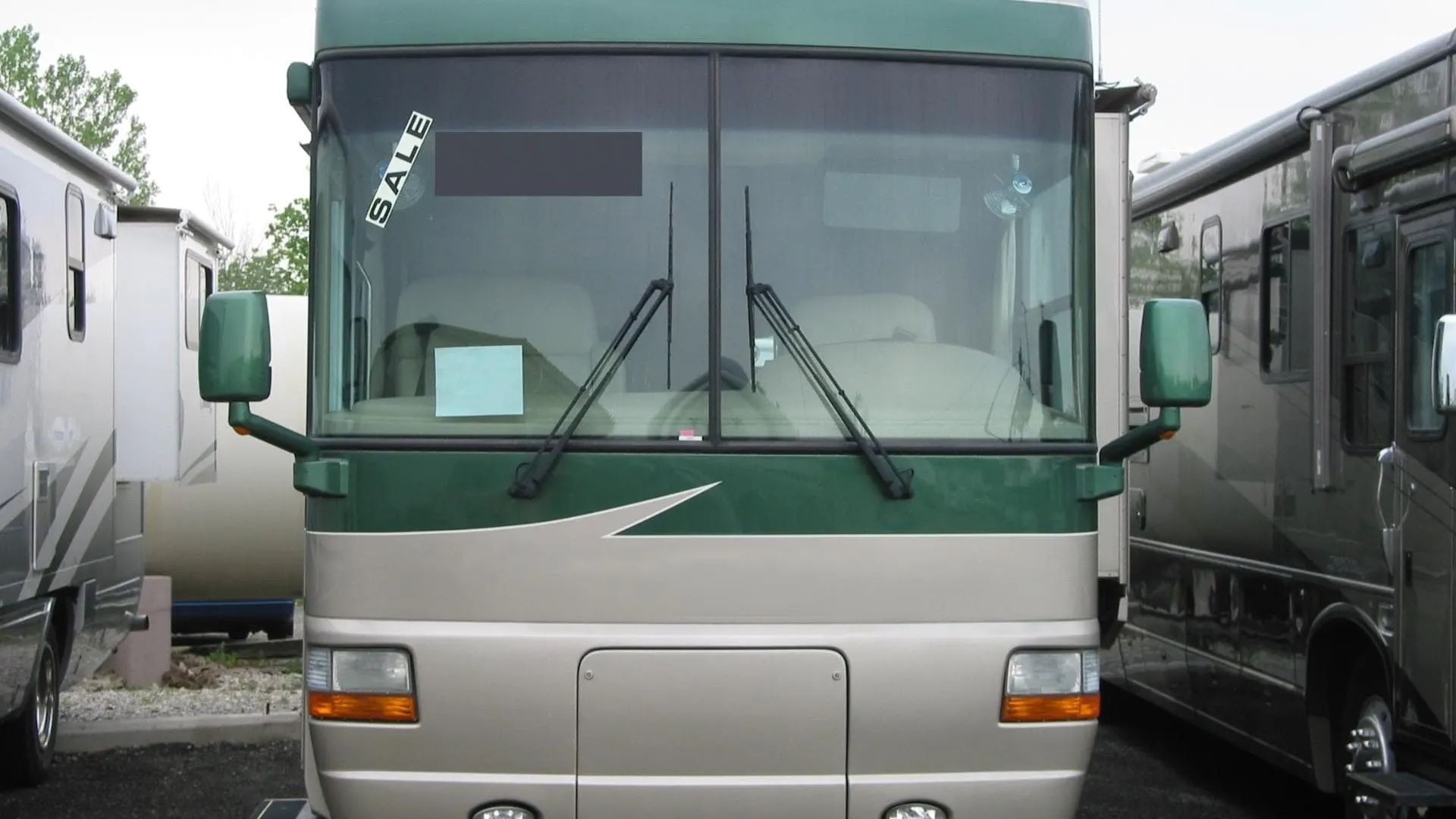
There are a number of ways to search for used RVs and RV fixer uppers for sale.
Fixer upper RVs can be found in a variety of ways. Here are a few of the most common ways you might find a good RV fixer upper:
- Craigslist (search in your home state, or use onecraigs.com to search nationwide)
- Facebook Marketplace
- eBay
- RV Trader
- RV Dealerships
But knowing WHERE to look for your diamond-in-the-rough RV is only the start. Knowing WHAT to look for is even more important!
15 Things to Look For When Shopping For an RV Fixer Upper
Title
Among the first questions you’ll want to ask a private seller is whether he or she has the title in hand. You’ll also want to know what type of title currently exists on the RV.
For example, you’ll want to avoid salvage titles because these generally indicate that the rig has either been involved in an accident or has sustained damage by some other means, which could include flooding.
There are RVs (newer and older) on the market that have been purchased at auction in locations where flooding has occurred. These rigs are often “dried out” and professionally cleaned, but if you look carefully you may find evidence of water damage along the walls or deep in closets or storage areas.
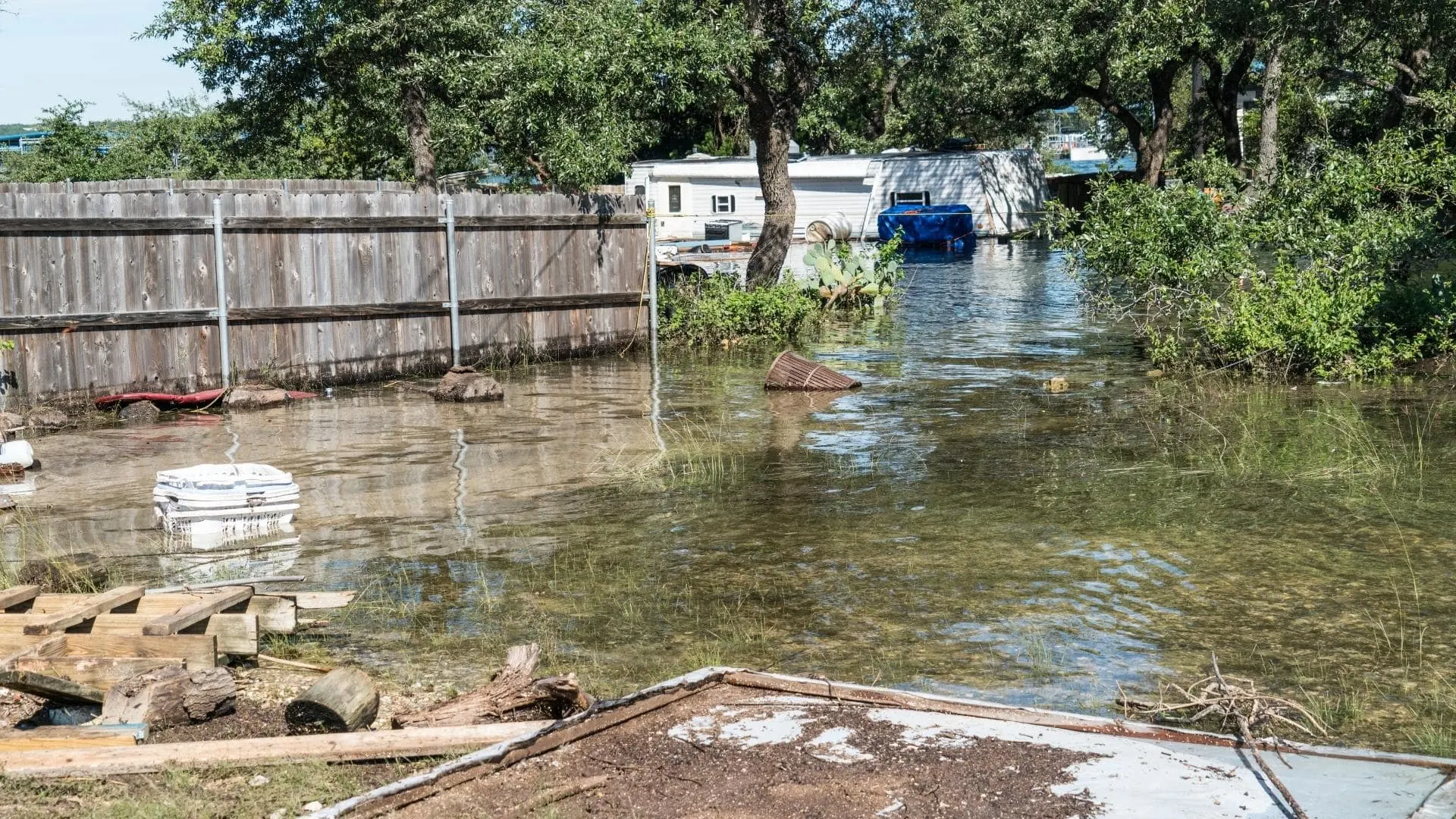
Sometimes RVs that have been involved in floods are sold at auction in other states. They’re dried out and cleaned, and sold to unsuspecting buyers. Buyer beware! Buying an RV that has been involved in a flood is never a good idea.
If you have any reason to believe that an RV has been involved in a flood, walk away – actually, run fast – because there may well be mold or other hidden damage, including to the electrical system, that you don’t want to be burdened with.
Price – Fair and Reasonable (For a fixer upper RV)?
There are lots of things to consider where price is concerned, but when you’re looking at a fixer upper RV, you’ll want to run a tally in your mind or on paper as you’re investigating the unit to consider the amount of money you’re going to have to spend to actually fix up the fixer upper.
This is something you can use to negotiate the price as well. You want to pay a fair and reasonable price, particularly considering the money you’ll be dropping into repairing and renovating.
As always, the market determines some of the selling price, but fixer upper RVs shouldn’t command top dollar unless they’ve already been fixed up! (Which would mean it wasn’t a fixer upper… it’s a fixED upper, LOL!)
Evidence of Water Damage
This is a big one – a huge one, in fact. When buying a fixer upper RV – OR any used RV – you need to very carefully assess the rig for evidence of water damage.
Look especially carefully at walls and ceilings, and around windows. Look around skylights, vent fans, vents, and any other areas where the roof or walls have been penetrated for various installations. Discoloration of the walls, peeling/peeled wallpaper or inner liner, and certainly, mold are all things to be keeping your eye on.
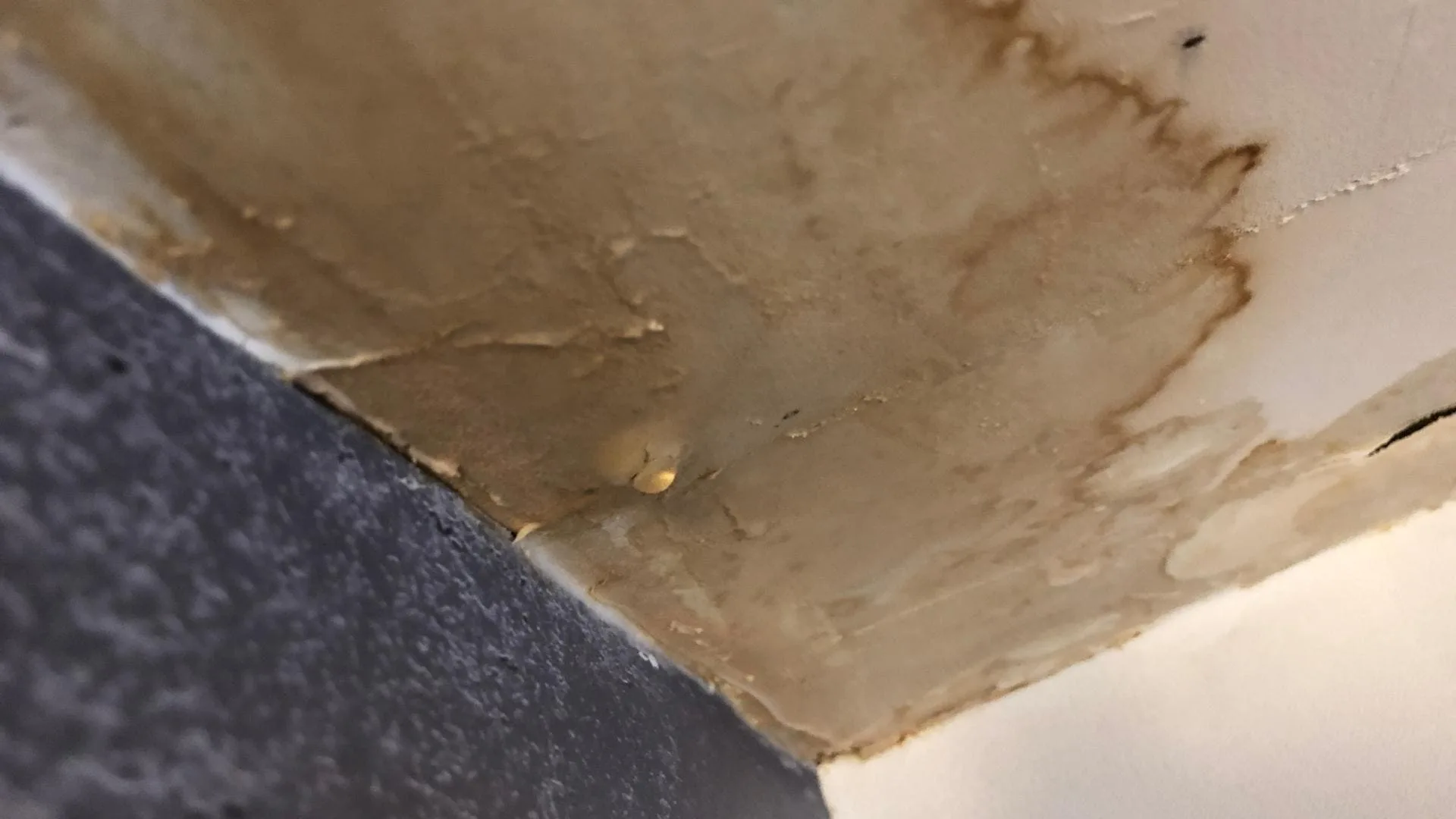
Evidence of significant water damage means stay away! RV water damage can have all sorts of serious consequences you’ll want to avoid at all costs. MINOR water damage may be easily and completely resolvable. Significant water damage is a sign of a poorly maintained RV with underlying problems.
Also carefully take note of any areas of the floor (and roof) that might have a “squishy” feel underfoot. This could indicate serious water damage and weakness under the floor.
It’s possible to find evidence of very minor water damage that hasn’t compromised the structural integrity of the rig in any way. But unless you can definitively determine that no structural damage has occurred and no mold has developed, walking away from a fixer upper RV with water damage is generally a good idea.
Condition of Roof
Assessing the condition of an RV roof can be difficult depending on whether or not you have the ability to get up on the roof and take a look around. In this case, however, you can pay for a professional inspection of an RV before purchasing, and the roof should be properly investigated.
What you’re looking for on an RV roof are any areas of obvious damage such as that which may have occurred from tree branches, hail, or even from age.
You’ll also want to look very carefully at the sealants around vents, skylights, antennae, wiring, and any area where the roof has been penetrated for various installations. If the sealants are cracked, dried out, or otherwise damaged, this indicates that the roof sealants have been neglected, and there could be hidden water damage to contend with. Soft spots in the roof structure are a sure-fire signal that there’s been water damage that went unrepaired… and that can lead to costly RV roof repairs.
Electrical Issues
When buying an RV fixer upper (or, honestly, ANY RV), be sure to try all lights and appliances, including the water pump, furnace, generator, air conditioner(s), and, if possible, the water heater. (If the RV is already winterized, this may be a problem.)
While it may not be easy to spot deeper electrical issues, checking everything you can for obvious ones is important. If the seller is unable or unwilling to allow you to try electrical components, then walking away is a good idea.
Even if an RV doesn’t have a charged battery, it should be able to be plugged in somewhere long enough to illustrate that the electrical system is working.
We’ll also note here that checking the wiring under the hood is also a good idea if you’re looking at a motorhome. Some rigs are stored outside and become nesting places for rodents and other critters, and the rig’s wiring becomes their convenient midnight snack. This type of damage can be devastating and extremely expensive to repair.
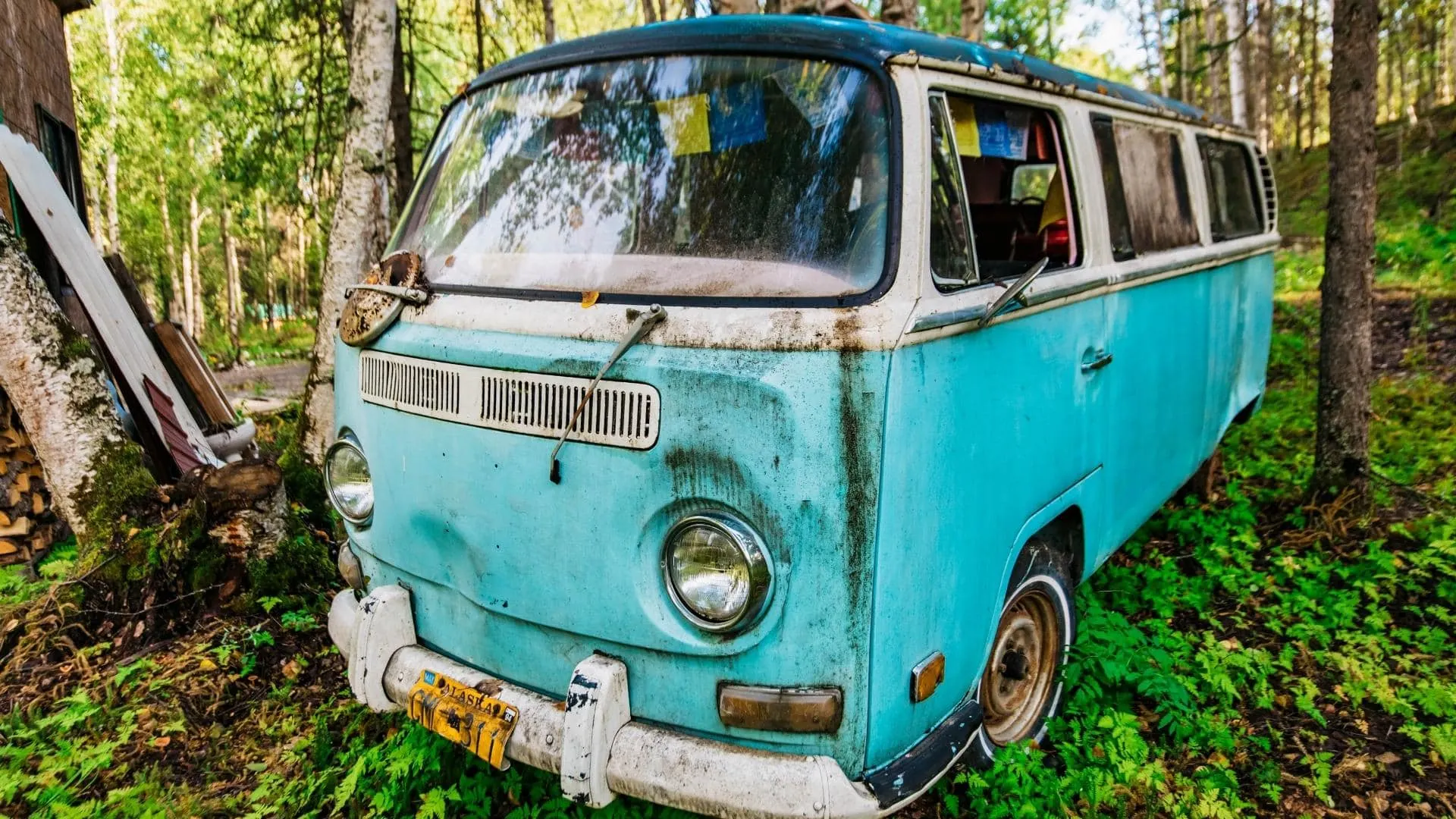
Rust on an RV is never a good thing. Rust is usually malignant and it spreads quickly. Always check carefully for areas of rust, including those which may have been covered up, “patched up”, or painted prior to being put on the market. (Any bubbling is a giveaway!)
Most shoppers are aware that rust is a bad thing. But don’t fall for a seller telling you that there’s just a smidge of “surface rust” which is “normal” for the age of the rig.
Rust is an enemy that can indicate impending doom in the way of structural damage. It’s costly and difficult to repair well, and it’s almost always malignant, meaning that once it starts, it spreads.
Look carefully around all windows (including the windshield if there is one), doors, (open them all and look carefully), all around the edges of the rig, all around the wheel wells, and then get on your back and look carefully at the undercarriage. Again, if you’re not capable of doing this, pay a professional to put the rig up on a lift and check for rust. Rust is an enemy you don’t want to fight, because you’ll rarely win.
Condition of Undercarriage (including axles)
Speaking of the undercarriage, the condition of this area of any type of vehicle is a critical part of its overall health. The integrity of the axles and possibly even the undercarriage itself can be difficult to assess without professional eyes. This is another good reason why a professional assessment can be especially helpful – or even critical.
But if you see significant areas of rust or evidence of widespread oil leaks, for example, you can rest assured that you’ve uncovered damage that warrants walking away.
Tires
Tires can often be assessed simply by visual inspection, particularly if there are obvious signs of wear, cracking, or dry rot. However, tire age can be deceiving sometimes, so it’s always good to actually check the date on the tires themselves.
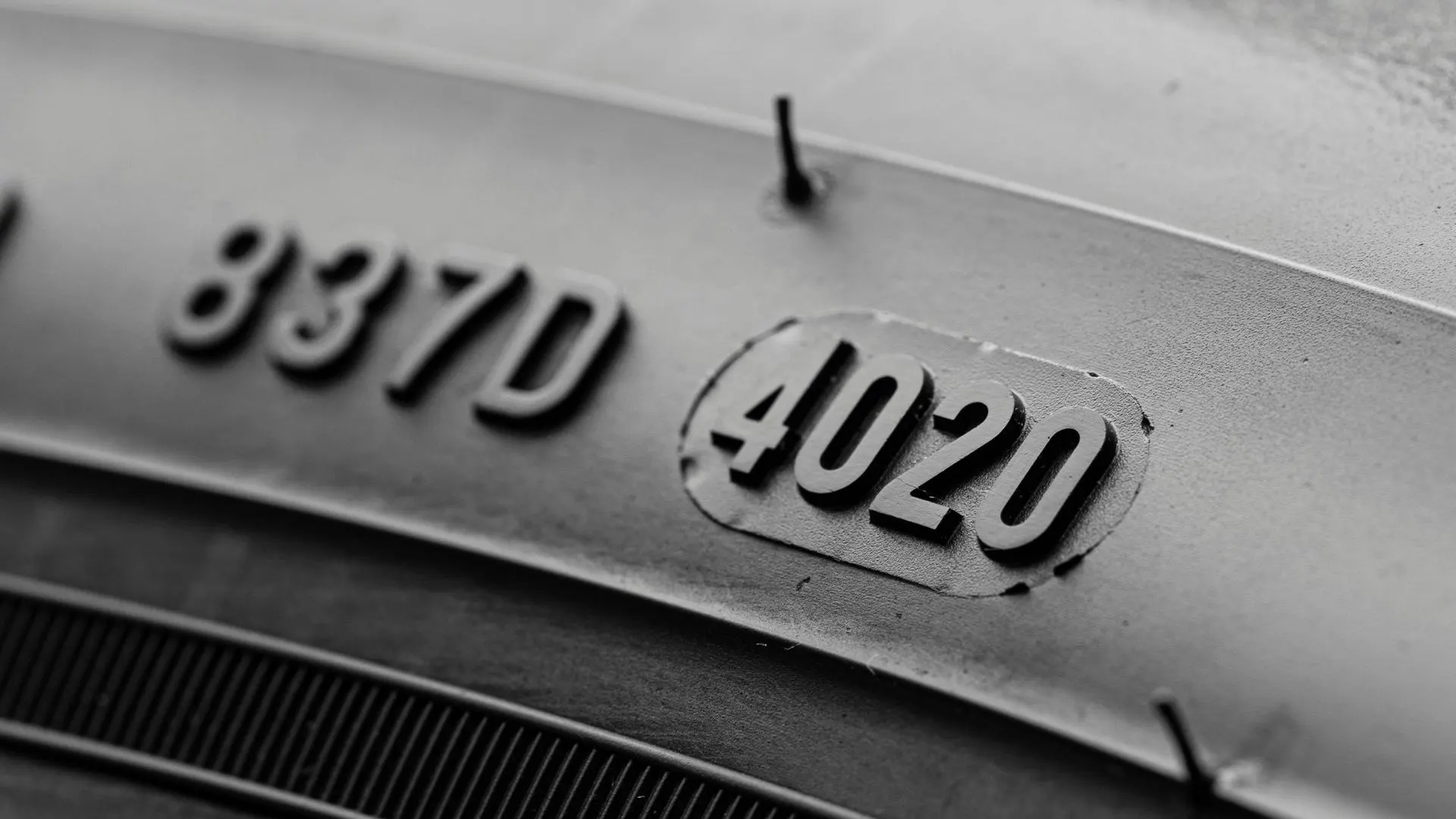
Always check the DOT date code on all of the tires when buying an RV. The last four digits will indicate the week and year when the tire was manufactured. Knowing the age of the RV tires in advance is important, because they may need to be replaced even if they look good.
In order to do this, you’ll simply need to look at the tire’s sidewall near the edge of the rim for a series of characters beginning with the letters “DOT”. This is the Department of Transportation date code. You should see “DOT” and a string of characters. The last four digits will tell you the month and year the tire was manufactured.
If, for example, the last four digits are 3419, then the tires were manufactured in the 34th week of 2019.
(Just as an aside, though it’s unlikely that you’d ever run into this, prior to the year 2000, tires were dated differently. So if you don’t see this type of dating on the tires of your RV fixer upper, then the tires were manufactured prior to 2000 and need to be discarded immediately! The longest any RV tire manufacturer recommends running tires for is between 7-10 years.
Bear in mind that frequently the date code might not be showing on the outside of the tire, and you’ll need to take a look on the other side of the tire, (toward the inside of the rig), to find the date code.
If the tires are older than six years, use that as a factor of your price negotiations, because you’re going to need to replace the tires, and tires are expensive (especially big ones).
Working Generator?
Not everyone is interested in a generator, but many travelers – particularly those of us who are interested in boondocking – appreciate an onboard generator as a source of power when needed.
If you’re in the market for a fixer upper RV, and you’re looking at a rig with a generator, have the seller start it up for you. If it doesn’t start, try starting it with the RV’s engine running (the generator is most often started using the chassis battery that starts the engine… and if that’s low on charge, having the engine running means the alternator will provide the necessary starting amps). If it still doesn’t start, you could have a gummed-up carburetor – or worse.
If it does start, give it a few minutes to run, and then put a load on it (the air conditioner is a good test) and see if it continues to run. Let the AC run for a bit not only to see if it blows cold air but also to test the continuous running of the generator.
Remember that an older rig with a generator that has very few hours on it may seem like a good thing, but in reality, it’s not. A generator is a small machine and it needs to be run. Gasoline sitting in an engine-driven device for a long time, unused, makes for a sticky situation – quite literally.
If you’re looking at a generator with a significant number of hours on it, (like 50-100 hours for every year of the life of the generator), that’s a good sign. A 10-year-old rig with a generator that has “only” 50 hours on it doesn’t bode well for the health of that generator. Ask any service technician and they’ll tell you that lack of use is the biggest threat to the longevity of a generator (or any engine-powered device).
Air Conditioner (Cab and House)
One of the great comforts of any vehicle these days is a working air conditioner. Gone are the days of rolling down the windows and feeling the warm breeze in our hair. (For some of us, gone is the hair itself!) When you’re shopping for an RV fixer upper, be sure to run the cab/dash AC, as well as the house AC if possible.
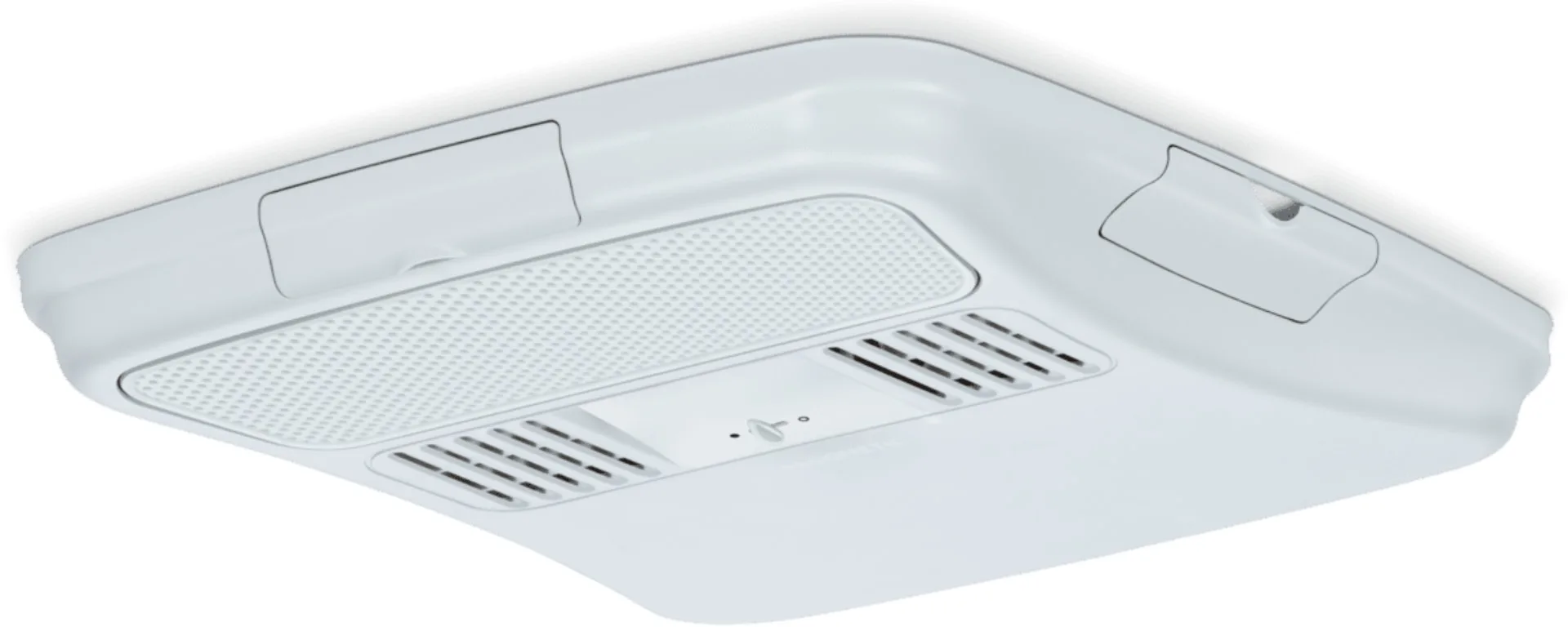
If you plan to travel in areas where the summer heat can be brutal, you’ll need to have working cab and house air conditioners. Be sure to check that they’re both blowing cold air when you’re shopping for an RV fixer upper!
Making sure that you’ll be able to have a cool, comfortable driving experience, and that you’ll have a working AC unit in your living space is a good idea – because AC units can be considerably expensive to repair.
Condition of Water Heater
A working water heater means a hot shower, and to most of us that’s a pretty important luxury. If a water heater hasn’t been adequately maintained and cared for, it may well need to be replaced. Water heaters are expensive, so unless the one in your RV fixer upper candidate is working, you’ll want to either reconsider the rig or use that factor to negotiate the price downward.
Many RV water heaters have anode rods that serve to protect the tank itself from minerals that would otherwise eat away at it. The anode is a sacrificial rod that, if replaced regularly, keeps the tank in good shape from year to year.
However, if the previous owner(s) of the rig you’re looking at didn’t winterize the water heater and maintain it by regularly replacing the anode rod, then you could be looking at a water heater that’s damaged beyond repair.
Heating System
The heating systems of most RVs use a combination of electricity and another fuel source (typically propane or diesel) to produce heat to warm your living space. Both of these factors need to be functioning optimally in order for you to be able to use the heating system.
You can have the seller run the heat for you, and you can use your own senses to establish whether the heater is working and not emitting an odd smell. But unless it’s running perfectly, the assessment of an RV’s heating system may be another matter best left to a professional RV technician, since it may take some digging to figure out what the issue is.
Plumbing
An RV’s plumbing system consists of pipes, fittings, valves, a water pump, fixtures like faucets and showerheads, toilets, and gate valves. These are all things you’ll want to check when you’re buying an RV fixer upper – otherwise, you could find yourself repairing or replacing much of the plumbing system, and that’s a big job.
When you’re shopping for a fixer upper RV, be sure to run all of the plumbing through the paces. Turn on every faucet, the indoor shower, the outdoor shower, flush the toilet, and look around for leaks. Look under the kitchen faucet, sinks, around the toilet, locate the water pump, and feel around it for leaks.
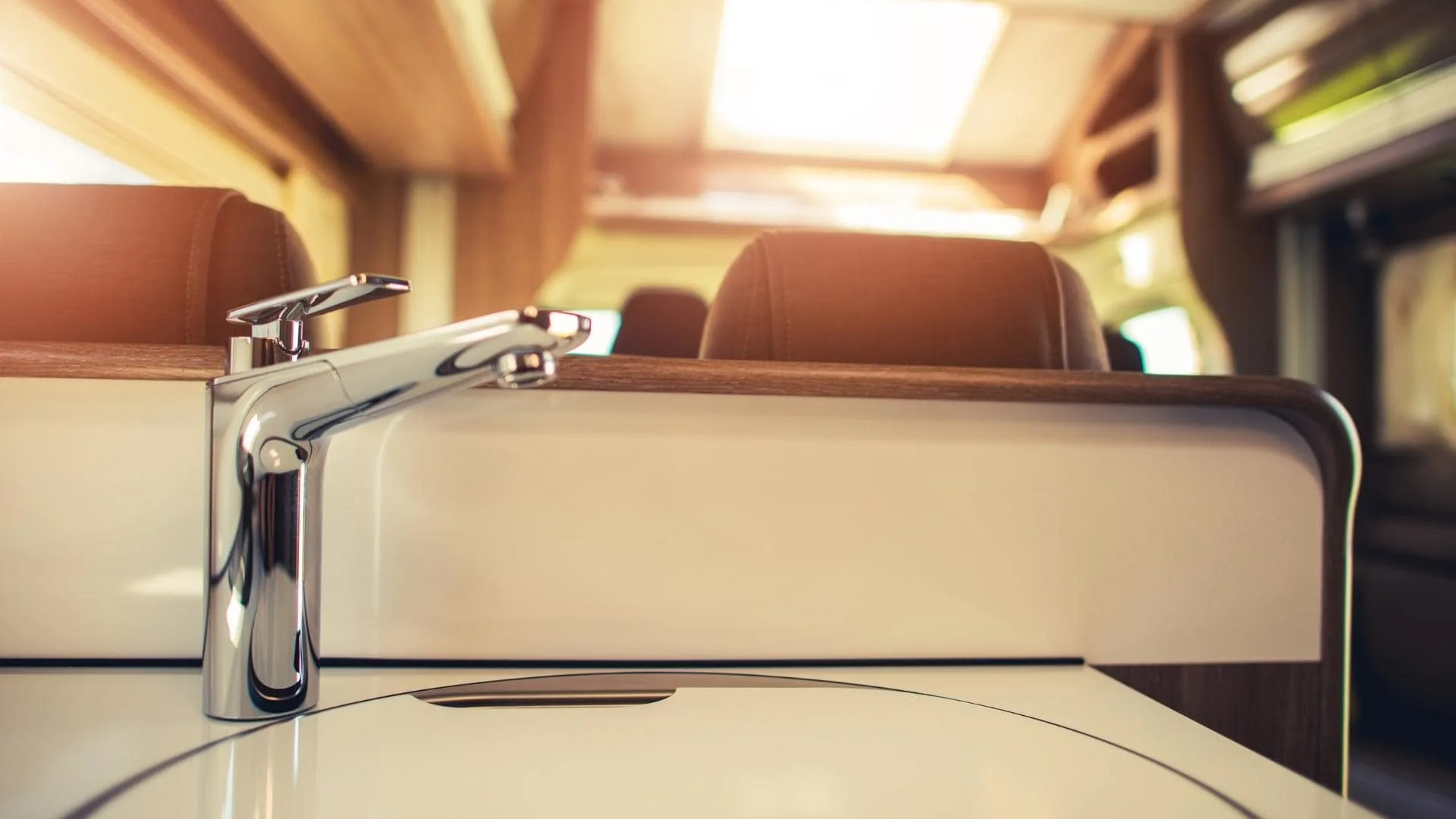
Be sure to check all plumbing sources throughout the RV, including sinks, showers, and toilet. Also, check the plumbing for leaks, and listen to the water pump to run when it’s not supposed to be running!
There are some small, relatively delicate parts inside an RV water pump and if exposed to sub-freezing temps they can crack and leak. When you turn on the water pump, listen. You should hear a sound only briefly, and then the pump should be silent until you turn on the water somewhere in the RV. If the water pump keeps running, then you’ve got a leak somewhere.
Open the gate valves if you can. If an RV has been sitting around for a while, it’s possible that the gate valves may need to be replaced. And, after running some water into both the black & gray tanks, check the gate valves for any sign of leaking. While it’s not difficult or expensive to repair/replace a waste tank valve, you’ll want to be aware of it.
Checking the entire plumbing system may be somewhat tedious, but it’s well worth the effort.
Engine or Towing System (depending on the type of RV)
If you’re in the market for a fixer upper motorhome, you’ll have an engine & drivetrain to check thoroughly. The investigation of an engine (as well as other parts of a motorhome) is well worth the cost of a professional eye.
Similarly, if you’re buying a travel trailer, getting a professional eye on the towing system (coupler, chains, electrical connector, etc) is a wise move. The integrity of your towing system is essential for your safety and that of those traveling around you.
Unless you have expertise in the area of mechanics or tow systems, we’d recommend having a thorough mechanical inspection prior to buying a fixer upper or any used RV.
Fixup Costs
When you’re assessing the potential purchase of any fixer upper RV, you need to consider whether it might cost more to repair and renovate it than it would to buy a newer RV that would require less work and less money.
If a newer RV would require a similar (or smaller) financial investment, you might be better off moving in that direction, unless you have your heart set on renovating and repairing an older rig.
Is Fixing Up an Old RV Worth It?
There are pros and cons to fixing up an old RV.
On the “pros” side, renovating an RV allows you to make it yours – to establish your own decor and ambiance throughout the rig – and to go through the entire rig ensuring that everything works properly (which is a great way to familiarize yourself with every nook and cranny).
Renovating an old RV can also be a rewarding experience (provided it doesn’t wear you out and take all your money)!
Another benefit to fixing up an older rig is the education that accompanies the process. We learn a lot in the process of repair, renovation, and maintenance, and that knowledge comes in handy once accumulated.
On the “cons” side, fixing up an old RV can find you unearthing problem after problem. While working on one issue, you can find others – and you may find that you’ve gotten in over your head with more issues than you bargained for when you bought the rig. This can be a frustrating, time-consuming, and expensive proposition.
The reason you’re buying an RV in the first place is to get out there and enjoy traveling and camping in it. So, whatever works for you to be able to achieve that end goal will be worth it in the end.
Geek Out with Us Every Week
Join our newsletter to learn about all things RV-related. Every week we offer free tips, tricks, product reviews, and more to our online community of RVers. So, whether this is your first time on the road or you’re a seasoned expert, we’d love for you to geek out with us!


Jeff
Saturday 21st of January 2023
Another issue to "watch" for and avoid is obvious signs of rodent infestation. Many potential project RV's spend some time parked and if there was any food left on board (it happens!)mice take up residence and much of the damage they do is hidden in the walls, duct work and wiring chase-ways.
John Schretlen
Saturday 22nd of January 2022
This article was more interesting than I thought it might be, since I'm not looking for a project. One comment:
Another place to find some really great deals is the insurance auctions, if your state / province does that.
A true story:
One of my co-workers ( Brand "A" trailer owner) heard about a brand new "A" trailer that was being taken to a dealer and was rear-ended hard enough to be a write off by the insurance company.
He bought the damaged unit at auction and spend the winter re-building the back end. He sold his 2 year old unit and kept the 'rebuild' and made money on the deal. He told me that the money he made on this first 'rebuild' paid for a bunch of new metal working tools and all the wood and aluminum sheets rivets and other parts needed for the repair.
The local "A" community was so impressed with his quality work that his part time hobby is now a part time money-making job. He only works on "A" brand trailers and only uses the correct (best) materials and parts.
I know that your article is intended for somebody wanting a fixer-up project; but wanted to say that sometimes it becomes more.
TheRVgeeks
Saturday 22nd of January 2022
Interesting story, John! It's amazing how life can take such interesting turns! Thanks for sharing.
Gay Camping Enthusiast
Saturday 22nd of January 2022
Another great article. If only I had someone to share the experience with. I'd buy a 1970s motorhome. The vehicles that interests me the most are the GMC Motorhome, produce between 1973 and 78, the FMC Motorhome, 1973 and 76, the Dodge Travco 270 Motorhome (1960s to 1980s), and the Vixen 21 Motorhome (1986-89). As long as everything is solid, and most things work like they should, there'd be less work to have to fix up.
TheRVgeeks
Saturday 22nd of January 2022
Classic choices, Jason!